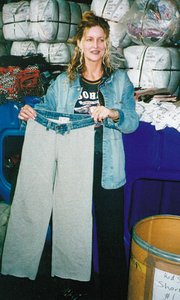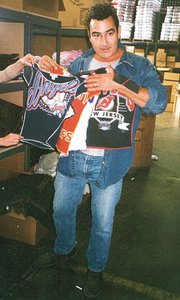Niche Notebook: Contemporary Label Riley Revels in Its Vintage Roots
Vintage wholesale giant Born Again Clothing Inc. has made the leap to wholesale manufacturing by turning its second-hand merchandise into a fashion-forward sportswear collection.
A few years ago, owners Derek and Greg Banton created Riley, a young, hip and edgy branded label that incorporates vintage clothing into modern styles for women and children.
In doing so, Born Again parlayed its existing business into a new niche for the company.
In just two years, Riley’s retail business has grown from 200 to 2,500 doors, according to Greg Banton. The company also ships overseas to Japan, Hong Kong, London, Canada, France, Italy and Israel. Banton said Riley, which counts annual sales of close to $6 million, is on track to earn more than $10 million for 2002.
The label’s collection of sportswear consists of over 180 pieces, which are updated each season. Head designer Jeanine Mark sifts through piles of second-hand clothing for dead stock (old merchandise in mint condition that still has original hangtags) to integrate into new garments.
The line uses deconstructed fabrics, which are appliqueacute;d on sexy low-rise sweats, skirts and T-shirts or reconstructed into French terry and velour tracksuits with vintage denim waistband and denim pockets or 1960s striped baseball shirts with lace trimming.
No two pieces in Riley’s collection are exactly alike.
“One retailer might order six shirts, but each one has a different logo and there are no two of one kind,” explained Banton.
Riley, which is wholesale-priced between $19 and $110, sells in Fred Segal, Scoop, Neiman Marcus and Nordstrom, among other stores.
More recently, the company furthered its denim streak by debuting a new denim collection under the Riley label at the Intermezzo show in New York. The novelty-inspired line comes in five styles, including boot-cut and flair-leg, and features embellishments and cutout appliqueacute;s from vintage tablecloths and patchwork quilts.
If Riley’s sales remain on track, the company will earn $2 million in sales for 2003.
Specialty Business
When the vintage market was booming in the 1990s, several boutiques catered to Japanese consumers who built their market on retro American clothing. And, the Bantons were among a handful of West Coast used-clothing wholesalers to cash in on the revival.
“The buyers cleared out a lot of the quality stuff in small antiques shops and thrift boutiques around the country,” explained Kathleen Schaaf, owner of the Long Beach, Calif., retro boutique Meow, who remembers doing business with Born Again in the mid-’90s, when her closet-sized store catered to dozens of Japanese buyers in search of denim, sneakers and other specialty items.
American vintage sells particularly well in Japan, but the second-hand apparel market took a hit with the downturn of the Asian economy. In recent years, it’s become more of a specialized business, with savvy buyers looking for dead stock and collectors’ items.
For the Bantons, the time was right to find a new niche in the vintage market.
“The vintage market has become more focused and buyers only want really good pieces or the right piece. It’s become a specialized business where all of the vintage buyers have really become a hell of a lot better at the business,” explained Greg Banton, who said his vintage wholesale business decreased from 80 percent of the company’s overall business to 15 percent since launching Riley three years ago.
Swap-Meet Roots
Hailing from South Africa, the Bantons got their start in the apparel business nearly 20 years ago, selling leather handbags and belts at swap meets around Southern California. Then a friend told them where to buy used Levis for 50 cents a pound.
At the time, quality vintage items were abundant, Greg Banton said. Much of the company’s second-hand clothing came from rag houses, and the Bantons paid suppliers or “pickers” top dollar for quality apparel from thrift stores.
Born Again’s 19,000-square-foot warehouse in Vernon, Calif., is stacked floor-to-ceiling with bundles of vintage apparel, and containers filled with assorted vintage finds fill the center of the space.
The company’s warehouse is a mecca for retro retail enthusiasts—including Urban Outfitters, American Rag and Meow—and designers seeking inspiration for their collections.
In 15 years, the brothers have built an enormous reserve of vintage apparel (they currently own over a million pairs of denim). Their eclectic selection of inventory (some of which dates back about 70 years) includes rare designs by Halston, Andreacute; Courregrave;ges and Hermegrave;s. They also boast a used military uniform collection that includes authentic Eisenhower-style jackets and Vietnam-era jungle fatigues.
The warehouse is also filled with home fixings and accessories, including “Summer of Love” patchwork quilts, bark cloth curtains, tooled leather purses and an assortment of scarves and hats.
Born Again also specializes in classic sports apparel, including Ocean Pacific, Lightning Bolt and retro sports team T-shirts, which are currently being infused into Riley’s sports collection.
The company combined its marketing efforts by creating a Web site, www.bornagainclothing.com, that features a small sampling of Riley’s offerings as well as key pieces from Born Again’s stock.
Plans for new divisions are currently in the works. Next up for the brothers is a line of casual footwear—with details culled from Born Again’s inventory—for Spring 2003.























